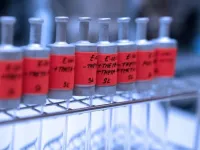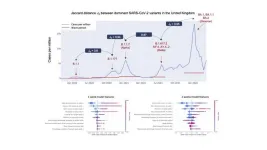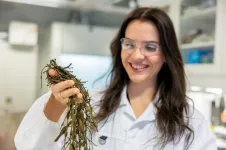(Press-News.org) In a report just published in the journal Nature Climate Change, researchers argue that tackling inequality is vital in moving the world towards Net-Zero – because inequality constrains who can feasibly adopt low-carbon behaviours.
They say that changes are needed across society if we are to mitigate climate change effectively. Although wealthy people have very large carbon footprints, they often have the means to reduce their carbon footprint more easily than those on lower incomes.
The researchers say there is lack of political recognition of the barriers that can make it difficult for people to change to more climate-friendly behaviours.
They suggest that policymakers provide equal opportunities for low-carbon behaviours across all income brackets of society.
The report defines inequality in various ways: in terms of wealth and income, political influence, free time, and access to low-carbon options such as public transport and housing insulation subsidies.
“It’s increasingly acknowledged that there’s inequality in terms of who causes climate change and who suffers the consequences, but there’s far less attention being paid to the effect of inequality in changing behaviours to reduce carbon emissions,” said Dr Charlotte Kukowski, a postdoctoral researcher in the University of Cambridge Departments of Psychology and Zoology, and first author of the report.
She added: “People on lower incomes can be more restricted in the things they can do to help reduce their carbon footprint, in terms of the cost and time associated with doing things differently.”
The researchers found that deep-rooted inequalities can restrict people’s capacity to switch to lower-carbon behaviours in many ways. For example:
Insulating a house in the UK can be costly, and government subsidies are generally only available for homeowners; renters have little control over the houses they live in.
The UK has large numbers of old, badly insulated houses that require more energy to heat than new-build homes. The researchers call for appropriate government schemes that make it more feasible for people in lower income groups to reduce the carbon emissions of their home.
Cooking more meat-free meals: plant-based meat alternatives currently tend to be less affordable than the animal products they are trying to replace.
Eating more plant-based foods instead of meat and animal-derived products is one of the most effective changes an individual can make in reducing their carbon footprint.
Buying an electric car or an electric bike is a substantial upfront cost, and people who aren’t in permanent employment often can’t benefit from tax breaks or financing available through employer schemes.
Other low-carbon transport options - such as using public transport instead of a private car - are made less feasible for many due to poor services, particularly in rural areas.
Sometimes the lower-carbon options are more expensive - and this makes them less accessible to people on lower incomes.
“If you have more money you're likely to cause more carbon emissions, but you're also more likely to have greater ability to change the things you do and reduce those emissions,” said Dr Emma Garnett, a postdoctoral researcher at the University of Oxford and second author of the report.
She added: “Interventions targeting high-emitting individuals are urgently needed, but also many areas where there are lower-carbon choices - like food and transport - need everyone to be involved.”
The researchers say that campaigns to encourage people to switch to lower-carbon behaviours have tended to focus on providing information. While this is important in helping people understand the issues, there can still be many barriers to making changes.
They suggest a range of policy interventions, such as urban planning to include bus and bike lanes and pedestrian-friendly routes, progressive taxation rates on wealth and income, and employer-subsidised low-carbon meal options.
END
Reducing inequality is essential in tackling climate crisis, researchers argue
2024-01-02
ELSE PRESS RELEASES FROM THIS DATE:
First step towards synthetic CO2 fixation in living cells
2024-01-02
Synthetic biology offers the opportunity to build biochemical pathways for the capture and conversion of carbon dioxide (CO2). Researchers at the Max-Planck-Institute for Terrestrial Microbiology have developed a synthetic biochemical cycle that directly converts CO2 into the central building block Acetyl-CoA. The researchers were able to implement each of the three cycle modules in the bacterium E.coli, which represents a major step towards realizing synthetic CO2 fixing pathways within the context of living cells.
Developing new ways for the capture and conversion of CO2 is key to tackle ...
Continuous glucose monitoring
2024-01-02
Monitoring glucose levels is one of the key elements in health monitoring. A research team has now developed a battery-independent fluorescent nanosensor based on single-wall carbon nanotubes and an inactive form of the enzyme glucose oxidase (GOx). Because the enzyme is not in its active form, the analyte is not consumed during the measurement, and continuous, reversible, and non-invasive bioimaging of glucose levels in body fluids and tissues is possible, the team reports in the journal Angewandte Chemie.
Blood glucose levels are typically measured using GOx-based electrochemical sensors. However, these sensors ...
Researchers receive USDA grant to study changing food spending patterns
2024-01-02
After a long day, there’s the age-old question of do we eat out or stay in?
Over the last decade, that answer has increasingly shifted to eating out.
In that timeframe, households have increasingly spent more money on food outside of the home than what's spent on eating at home. In that same time, the farmer’s share of the food dollar eaten outside of the home has declined while the share of food eaten at home has increased.
With a more than $550,000 grant from the National Institute of Food and Agriculture, researchers George Davis and Anubhab Gupta, in the Department of Agricultural and Applied Economics in Virginia Tech's College ...
High adolescent BMI increases risk of early chronic kidney disease, according to JAMA study by Hebrew University researchers
2024-01-02
New study finds that adolescent obesity significantly heightens the risk of developing early chronic kidney disease in young adulthood. Even those with high-normal BMI are at risk. Severe obesity poses the highest risk, but even mild obesity and being overweight contribute significantly to this increased risk for both males and females. Lowering obesity rates in adolescents is crucial to better managing the risk of kidney disease and subsequent cardiovascular issues. This study emphasizes the need for preventive measures and management of risk factors associated with chronic kidney disease ...
Healthy omega-3 fats may slow deadly pulmonary fibrosis, research suggests
2024-01-02
Could healthy fats found in nuts and fish slow the progression of potentially deadly lung scarring known as pulmonary fibrosis and delay the need for lung transplants?
UVA pulmonary researchers looked at the association between blood-plasma levels of omega-3 fatty acids – the heart-healthy fats found in foods such as salmon and flaxseeds – and the progression of pulmonary fibrosis, as well as how long patients could go without needing a transplant. The researchers found that higher levels of omega-3 were associated with better lung function and longer transplant-free survival.
While more research ...
Predicting COVID-19 variant waves with AI
2024-01-02
An AI model can predict which SARS-CoV-2 variants are likely to cause new waves of infection. Current models used to predict the dynamics of viral transmission do not predict variant-specific spread. Retsef Levi and colleagues studied what factors could shape the viral spread based on analysis of 9 million SARS-CoV-2 genetic sequences collected by the Global Initiative on Sharing Avian Influenza Data (GISAID) from 30 countries, along with data on vaccination rates, infection rates, and other factors. The patterns that emerged from this analysis ...
Cultivated kelp can now be as good as wild kelp
2024-01-02
Norway’s exports products derived from from tangle kelp (Laminoria hyperborea) and knotted kelp (Ascophyllum nodosu) to the tune of more than NOK 1 billion a year. The industry mainly extracts alginate from kelp, which is used in over 600 different products as diverse as paint, soft serve ice cream, sauces, bandages, nappies, acid reflux medicine and material for encapsulating cells and medicine. However, the market is far from saturated.
“Alginate is becoming a scarce commodity on the global market. There are great opportunities here if we could cultivate more kelp that yielded alginate of good enough quality,” says Finn Aachmann, a professor at the Norwegian ...
Researchers identify new coding mechanism that transfers information from perception to memory
2024-01-02
Our memories are rich in detail: we can vividly recall the color of our home, the layout of our kitchen, or the front of our favorite café. How the brain encodes this information has long puzzled neuroscientists.
In a new Dartmouth-led study, researchers identified a neural coding mechanism that allows the transfer of information back and forth between perceptual regions to memory areas of the brain. The results are published in Nature Neuroscience.
Prior to this work, the classic understanding of brain organization was that perceptual regions of the brain represent the world "as it is," with the ...
A novel switch to turn genes on/off on cue, a promising step toward safer gene therapy
2024-01-02
Just like a doctor adjusts the dose of a medication to the patient’s needs, the expression of therapeutic genes, those modified in a person to treat or cure a disease via gene therapy, also needs to be maintained within a therapeutic window. Staying within the therapeutic window is important as too much of the protein could be toxic, and too little could result in a small or no therapeutic effect.
Although the principle of therapeutic window has been known for a long time, there has been no strategy to implement it safely, limiting the potential applications of gene therapy in the clinic. ...
Food insecurity among low-income adults dropped nearly 5% during pandemic-era SNAP expansion
2024-01-01
Embargoed for release until 5:00 p.m. ET on Monday 1 January 2024
Annals of Internal Medicine Tip Sheet
@Annalsofim
Below please find summaries of new articles that will be published in the next issue of Annals of Internal Medicine. The summaries are not intended to substitute for the full articles as a source of information. This information is under strict embargo and by taking it into possession, media representatives are committing to the terms of the embargo not only ...




